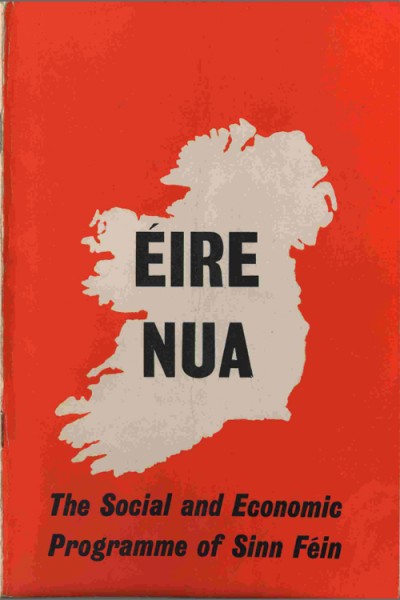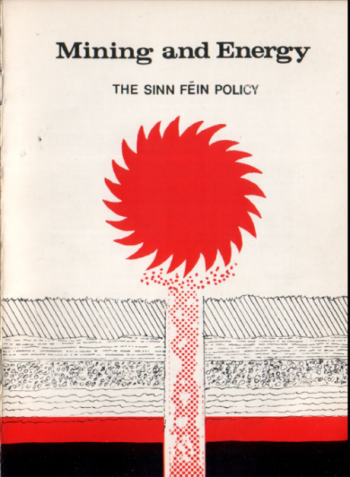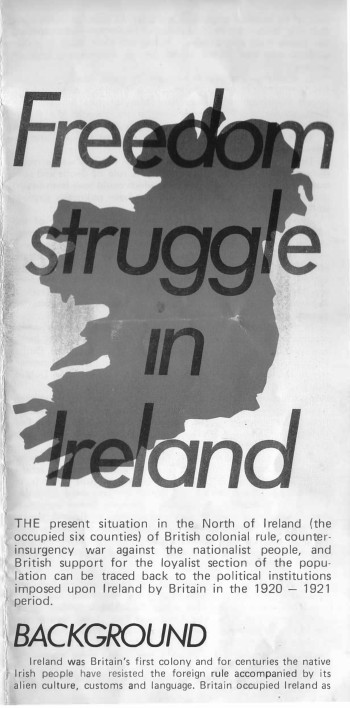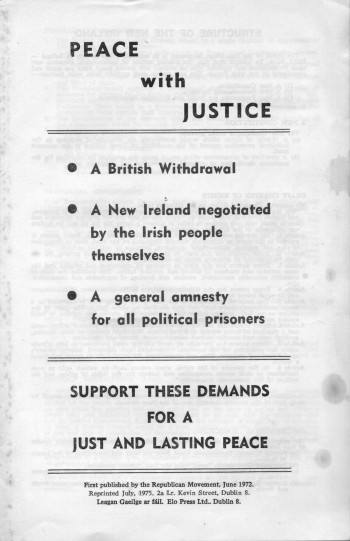Éire Nua
The Social and Economic Programme of Sinn Féin

| Date: | January 1971 |
|---|---|
| Organisation: | Sinn Féin |
| View: | View Document |
| Discuss: | Comments on this document |
| Subjects: | Éire Nua |
Please note: The Irish Left Archive is provided as a non-commercial historical resource, open to all, and has reproduced this document as an accessible digital reference. Copyright remains with its original authors. If used on other sites, we would appreciate a link back and reference to The Irish Left Archive, in addition to the original creators. For re-publication, commercial, or other uses, please contact the original owners. If documents provided to The Irish Left Archive have been created for or added to other online archives, please inform us so sources can be credited.
Commentary From The Cedar Lounge Revolution
9th February 2009
Éire Nua is a fascinating document that was of pivotal significance as a touchstone of of Provisional Sinn Féin (apologies to those who dislike the usage of the term “Provisional”, but in this case its difficult for those who are searching on the internet to distinguish correctly between the different organisations during the 1970s. This was their path away from the Marxism of the Official Sinn Féin made manifest. And this is clearly laid out, even in the subheading… The Social and Economic Programme of Sinn Féin.
The overall appearance of the document is of a sophisticated pamphlet, very much of its time. Simple but effective drawings inside frame chapter headings. The cover is a simple orange. There is no hint of green.
It’s a crisp read at a mere 56 printed pages, and at this remove surprisingly uncontentious. Not that it isn’t aspirational, but it does depend upon a fairly unlikely set of circumstances coming into play for Sinn Féin to achieve these goals.
That said there is a strong emphasis on “Christian’ values throughout, from the Réamhrá which suggests that ‘amongst our objectives are the establishment of “a reign of social justice based on Christian principles by a just distribution and effective control of the nation’s wealth and resources” and the institution of “a system of government suited to the particular needs of the people”.
That this leads to - at this remove - some intriguing contradictions, not least the pre-eminence of ‘the State’ across a range of areas which perhaps points to the necessity to balance competing strands within what in truth was a fairly broad movement.
Indeed note point 7 in the Réamhrá which proposes that:
Private enterprise will still have a role to play in the economy but it will be a much smaller role than it has today. It will have no place in key industries and State incentives will favour co-operative projects as the most socially desirable. No non-national shall be allowed to have a controlling interest in an Irish industry.
That last sentence is somewhat tautological in the context of those preceding it.
But outright statism is avoided by recourse to ‘the main instrument of economic development’ which ‘will be co-operative enterprises in production, distribution and exchange’. And these are positioned within an explicitly Irish tradition… ‘These will be based on the Comhar na gComharsan philosophy which is fonded on the right of worker-ownership and is native Irish as well as being co-operative or distributist in character. Each individual worker will own an economic unit of the means of production in the form of farm, workshop, business or share in a factory or other co-operative’.
And this blending of radicalism with traditionalism continues throughout (although worth noting how reference to ‘the means of production’ informs the analysis).
In some respects the most interesting feature of the approach outlined here is the confident assertion that Ireland can avoid repeating the ‘mistakes’ of other nations. This is seen in reference to transport and other areas.
Consider the section on Education which places considerable emphasis on the restoration of Irish (and the idea of ‘ensuring the development and equipment of all the moral, intellectual an physical powers of children so that they will become God fearing and responsible citizens of a free independent nation’), but intriguingly although inter-denominationalism is promoted there is no sense that the structural ownership of schools would be altered.
And a further fascinating point, in the section on Trade we are told:
Sinn Féin would do as Sweden, Switzerland, Finland, Austria, Iceland, Yugoslavia and many other European counties (sic) have done; seek Associate Membership or a trade agreement with the EEC while diversifying trade as much as possible… Should Ireland be forced into the EEC on England’s heels Sinn Féin will resist and oppose Brussels domination just as the Irish people have resisted British domination for centuries.
A de facto National Health Service is proposed, albeit with ‘nominal charges.. For prescriptions, for those who can afford to pay them’. Note the point made… ‘the various features of other national health systems will be studied and there will be consultation with the medical profession at all stages’.
Nor is the former enemy within ignored… In the Réamhrá mention is made of the ‘past few years… Devoted to preparing this Social and Economic Programme…. Some of those who were involved in an attempt to take over the Republican Movement had it suppressed, however, in favour of a more extreme draft outline which was never published. During the past 12 months the programme has been revised, updated and prepared for publication’.
But it is Appendix which was to prove entirely contentious in future years. This laid out “The Structure” of a federal state in Ireland and strong Provincial Governments in Uladh, Laighean, Chonnacht and na Mumhan.
Or as it states:
The establishment of Dáil Uladh would be the first step towards the creation of this new government structure for the whole island. By thus creating a Provincial Parliament for the nine counties of Ulster within a New ireland, the partition system would be disestablished and the problem of the border removed. Dáil Uladh would be representative of Catholic and Protestant, Orange and green, Left and Right. It would be an Ulster Parliament for the Ulster people. The Unionist-oriented people of Ulster would have a working majority within the Province and would therefore have considerable control over their own affairs. That power would be the surest guarantee of their civil and religious liberties.
That the obvious issue as to whether the three counties abandoned by partition would necessarily want to coalesce with their separated brethren has generally been overlooked in the opposite but equal dynamic of Republicans from the six counties who as time progressed saw this as merely instituting Unionist rule in the context of a ‘New Ireland’. And for all that this was entirely symbolic and aspirational it was that sense that this plan simply did not address the realities of the situation that was - ironically - to provide much of the energy for those who would eventually replace the positions articulated in Éire Nua.
A useful contrast can be made with the text of the 1979 version, particularly the appearance of the term ‘democratic socialist’ in the 1979 version, as well as quotes from Connolly.
This text and these files are a resource for use freely by anyone who wants to for whatever purpose - that’s the whole point of the Archive (well that and the discussions). But if you do happen to use them we’d really appreciate if you mentioned that you found them at the Left Archive…




Comments
No Comments yet.
Add a Comment
Comments can be formatted in Markdown format . Use the toolbar to apply the correct syntax to your comment. The basic formats are:
**Bold text**
Bold text
_Italic text_
Italic text
[A link](http://www.example.com)
A link
You can join this discussion on The Cedar Lounge Revolution
By: WorldbyStorm Mon, 09 Feb 2009 20:20:09
DandC, no chance that you might have those, or have access to copies? It all sounds brilliant. Good point though in your last sentence, and I’d bet much the same was true for some (many?) people who joined the Officials during the same period.
Reply on the CLR
By: Dunne and Crescendo Mon, 09 Feb 2009 20:28:44
Unfortunately I don’t have any of them! There must be some out there though. The first time I read An Phoblacht was in 1979, just after the Mountbatten assassination and Warrenpoint. The masthead was green as far as I remember, but I certainly recall the headline ‘IRA makes Britain pay.’
Reply on the CLR
By: Dunne and Crescendo Mon, 09 Feb 2009 22:28:56
The above mentioned ‘Questions of History’ produced in Long Kesh is also very interesting, if it can be got.
Reply on the CLR
By: PJ Callan Tue, 10 Feb 2009 06:58:49
Well the O’Bradaighs have a gra for federalism owing in part to their Swiss ancestry.
I can truthfully say that in my own case I’ve had copies of Eire Nua seized from me by the Garda Special Branch!
Reply on the CLR
By: WorldbyStorm Tue, 10 Feb 2009 07:28:26
Seriously? How recently?
Reply on the CLR
By: Jim Monaghan Tue, 10 Feb 2009 09:28:55
Oh I have to add the quote form a then leading Provo now a leading 4 Courts lawyer
“Better the rattle of a Thompson than a barrell of Marxist phamphlets”
On a footnote could miost members of far left groups give an explanation of the differences. I suspect that most are only organisationally loyal.
Costello lost out not because he did not win the arguement but because the majority were organisationally loyal.
Reply on the CLR
By: splinteredsunrise Tue, 10 Feb 2009 10:36:27
I’ve been thinking about this, but I’m very wary of being wise after the fact. What were hardened positions in ’78 weren’t necessarily obvious in ’71 or ’69. But the overall aim was to have some kind of positive programme that would show the movement wasn’t merely made up of mad Catholics and anti-political militarists. (Although both types were there in force.) There was at the time a fairly small circle of ideologues who were involved in writing this, but over the years you got a wider layer who were deeply committed to the programme.
Daithi O Conaill was the main progenitor of federalism, and also had a particular interest in the co-op movement although that had been a prior feature of republicanism. The stress on co-operativism and on social Catholicism was not least to do with staking out a different and more “native” position from the Sticks who, it was felt, were more and more under the influence of Muscovite communism. (Although IIRC they didn’t become a formally Marxist party until the late 70s.)
I’d echo what DandC says about the 20s and 30s generation. There was always a biggish reservoir of republicanism in the poorer rural areas out west, where you’d got the big republican votes in ’48 and ’57. These were people who really had a visceral hatred for the Free State that northern republicans found difficult to understand. You got this coming up again in ’86 when most of the Belfast people really did feel that abstentionism was about old men clinging to their dogmas, where on the other side abandoning abstentionism was genuinely felt to be treasonable.
I’d also stress the western element in that the people in the north were generally characterised by unideological Defenderism. While in Dublin the movement was extremely weak in the 60s – probably not much bigger than the CP – and a lot of the leaders there, like Mac Giolla, were rural transplants. But you also had a situation where the Dail Chonnacht initiative, while it never really gained a mass character, did reach well beyond the usual suspects, and for that brief period there was some idea of a revolutionary process in the south. Obviously it didn’t work out that way.
One other thing that you don’t find in Eire Nua but that does have a connection to it is republican foreign policy. Ruairi did and does have a strong streak of romantic pan-Celticism, but he was also the guy who was keen to forge links with the likes of the Basques and Catalans and Corsicans.
This is another area where I have to be wary of wisdom after the fact, because at some point in the 1980s I got to be interested in Krutwig. A lot of what he says doesn’t make much sense outside the very particular context of Basque nationalism, but there was a general them of the internal decolonisation of Western Europe linked to a sort of decentralised socialism. Now, I never heard anyone in Ireland mention Krutwig directly, but his stuff had some influence in the debates within ETA (I have some interesting LCR/ETA-V stuff that may be worth posting) and so might have filtered through to those people with an interest in the Basque movement. Also, Yann Fouere was very active at the time with his idea of a Europe of the traditional regions and small nations. This was the sort of thing that won interest from intellectuals like Des Fennell and Michael D Higgins – where are they now, I wonder?
Reply on the CLR
By: Garibaldy Tue, 10 Feb 2009 10:57:20
Thanks for that SS. I’d agree with your story of people gradually becoming more politicised over a longish timeframe, compared to the old ideologues, who subsequently went in 1986. I’ve always found the pan-Celtic thing a little bit mad myself.
Reply on the CLR
By: ejh Tue, 10 Feb 2009 10:59:11
where are they now, I wonder?
Brittany
Reply on the CLR
By: splinteredsunrise Tue, 10 Feb 2009 12:39:30
Brittany? Well, there’s pan-Celticism for you right there.
Reply on the CLR
By: Neues aus den Archiven der radikalen Linken - eine Auswahl « Entdinglichung Fri, 13 Feb 2009 11:08:09
[…] Provisional Sinn Féin: Éire Nua […]
Reply on the CLR
By: top roulette system Sat, 12 Sep 2009 00:09:15
Irgend ne Ahnung wie sehr das verallgemeinerbar ist?
Reply on the CLR
By: Jim Monaghan Sat, 12 Sep 2009 18:54:31
A Socialist Europe would allow the flourishing of many currently marginalised cultures.I think many on the left accept the logic of Imperialist/capitalism that a lowest common denominator globalisation is inevitable.While there is a certain romanticism in the pan celtic thing I think it is a necessary part of a socialist program to recognise the langauge rights of minorities and assist in preserving these important cultural assets.The French state is amongst the worst on this.
I think the damage to the morale of people who are told their culture ia a mere patois and who much worse accept this causes immense harm.
For a diverse, with an immense range of cultures, Socialist Europe.
On a footnote more people speak catalan than dutch
Reply on the CLR
By: A furture united ireland? - Page 34 Sat, 17 Apr 2010 14:31:37
[…] […]
Reply on the CLR
By: Eire Nua Sat, 26 Feb 2011 07:40:53
[…] […]
Reply on the CLR
By: Junior Ministers Announced - Page 10 Thu, 10 Mar 2011 16:19:41
[…] […]
Reply on the CLR
By: Acuvue Oasys Rebate Wed, 27 Jul 2011 17:06:43
That was incredibly imformative. Many thanks for all of the content.
Reply on the CLR
By: Anonymous Wed, 08 Feb 2012 16:13:05
[…] […]
Reply on the CLR
By: Loyalist proposals to end the union – Willie Methven Sun, 04 Nov 2018 16:39:31
[…] Ireland was not new. It had been first mooted by Provisional Sinn Fein in 1971 under the title, Éire Nua. The proposal was for four regional assemblies based on the four provinces of Ireland – […]
Reply on the CLR
By: State Papers, Sinn Féin & Federalism • Dieter Reinisch Wed, 30 Jan 2019 10:10:33
[…] solution to secure “a lasting peace”. This federal solution has been tightly linked to the Éire Nua programme. Following the split of the Provisional Republican Movement at the Sinn Féin Ard-Fheis in […]
Reply on the CLR